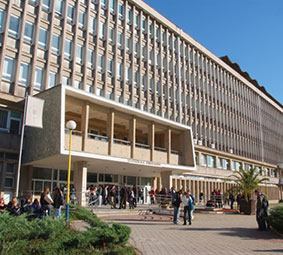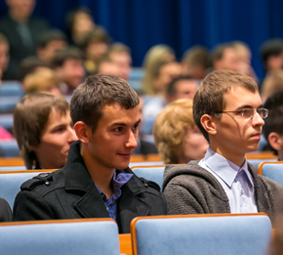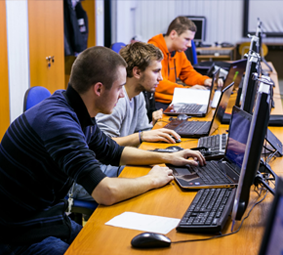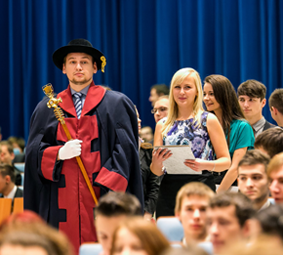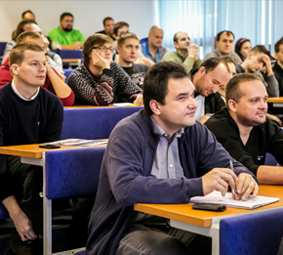V tomto projekte sa zameriame na aktualizáciu obsahu a zavedenie moderných prístupov do výučby predmetu Teória typov. Naším hlavným cieľom je zatraktívnenie klasického procesu výučby predmetu, zavedením nových edukačných nástrojov a metód pomocou moderných softvérových riešení. V rámci tohto cieľa vyvinieme softvér, ktorý bude interaktívne, resp. automatizovane emulovať procesy výpočtov prostredníctvom vizualizačných nástrojov simulujúcich klasický postup výpočtu človekom. Zároveň do výučbového procesu zahrnieme využitie interaktívnych dokazovacích systémov, pomocou ktorých je možné modelovať jednotlivé teórie typov, a dokazovať ich vlastnosti prostredníctvom formálnych dôkazov. V rámci čiastkových cieľov sa zameriame na tvorbu webového portálu, aktualizáciu a rozšírenie existujúcich študijných materiálov (učebnica a prednášky). Vypracujeme novú učebnicu venovanú využitiu interaktívnych dokazovacích systémov pre účely preberaných teórií typov. Pripravíme zbierku riešených príkladov a pracovné listy pre laboratórne cvičenia.
Projekty
Vedeckovýskumné projekty
|
KEGA
052TUKE-4/2025
1. január 2025 do 31. december 2027
Ing. Ján Perháč PhD. |
|
VEGA
1/0025/22
1. január 2022 do 31. december 2025
Cieľom projektu je deskripcia a explanácia slovotvorby a morfematiky slovenského slova. doc. Ing. Ján Genči PhD. |
|
APVV
APVV-23-0408
1. júl 2024 do 30. jún 2028
Aby boli prístupnejšie odborníkom z praxe, je potrebné preniesť globálne architektonické znalosti na lokálnu úroveň spoločností zaoberajúcich sa vývojom softvéru a dokonca aj jednotlivých tímov a nechať, aby sa tam vyvíjali s ohľadom na kontext, v ktorom sa používajú. Napríklad návrhové vzory by mohli byť preformulované a prispôsobené, špecifické sekvencie vzorov by boli vytvorené a podporované úspešnými príbehmi tej-ktorej špecifickej komunity (takzvané príbehy vzorov) atď. Architektonické znalosti je potrebné ďalej rozvíjať s ohľadom na skutočnosť, že súčasné softvérové systémy fungujú v edge–cloud kontinuu. Edge–cloud kontinuum zavádza nové možnosti variácií, ktoré závisia od toho, ako je systém nasadený na úrovniach edge, mist, fog, a cloud. Ďalšou výzvou je, ako efektívne organizovať ľudí v takomto prostredí. Časti týchto, lokálne vyvinutýc h vedomostí, by si potom našli cestu na globálnu úroveň vo vedeckých článkoch, knihách alebo dokonca blogoch a podobne. V tomto projekte vyvinieme metódy vývoja lokálnych variantov návrhových vzorov a jazykov vzorov, aplikáciu návrhových vzorov v edge–cloud kontinuu, aplikáciu radov softvérových výrobkov v edge–cloud kontinuu a aplikáciu organizačných vzorov vývoja softvéru v edge–cloud kontinuu. Na podporu a vyhodnotenie metód vyvinieme zodpovedajúce nástroje. Očakávame tiež, že budeme dolovať a vyjadrovať v súčasnosti neznáme návrhové a organizačné vzory a jazyky vzorov pre edge–cloud kontinuum. Vyvinieme štyri evaluačné scenáre: telemonitorovanie zdravotného stavu pacienta, súlad automobilového softvéru, inžinierstvo obsahu vzdelávania a vývoj v otvorenom priestore. prof. Ing. Jaroslav Porubän PhD. |
|
APVV
APVV-23-0196
1. september 2025 do 30. jún 2028
Cieľom projektu EvPres je vyvinúť metodiku monitorovania stavu mostov, ktorá umožní presnú kvantifikáciu predpätých síl v predpätých betónových konštrukciách. Výsledky tohto projektu významne prispejú k hodnoteniu technického stavu mostov po celej Európe, čo pomôže predchádzať ich náhlemu zlyhaniu alebo predčasnému uzavretiu. EvPres tak predstavuje kľúčový krok k zvýšeniu bezpečnosti a efektívnemu využívaniu predpätých betónových mostov naprieč Európou. V rámci súčasného stavu poznania v oblasti kvantifikácie predpínacích síl v predpätých betónových mostoch boli identifikované tri hlavné výskumné medzery (RG):
Ing. Ján Perháč PhD. |
Vzdelávacie projekty
|
Uplatnenie nových princípov vo vzdelávaní IT špecialistov v oblasti formálnych jazykov a prekladačov
KEGA
030TUKE-4/2023
1. január 2023 do 31. december 2025
Predkladáme projekt, v ktorom sa zameriame na prepracovanie a rozšírenie existujúceho kurzu orientovaného na formálne jazyky a prekladače. Naším primárnym cieľom je rozšíriť obsah kurzu tak, aby zohľadňoval aktuálne poznatky z praxe v oblasti spracovania, generovania a prekladu počítačových jazykov. Čiastkové ciele sú orientované na tvorbu učebných materiálov, webovského portálu a podporného softvéru na emuláciu a vizualizáciu vybraných algoritmov a postupov z oblasti formálnych jazykov. Je predpoklad, že sa takto u študentov dosiahne ľahšie a rýchlejšie pochopenie teoretických a praktických princípov a zvýšenie záujmu nielen o predmet, ale aj o širšie základy a princípy. Očakávaným prínosom je tak lepšia dostupnosť výučbového obsahu pre študentov. Taktiež sa predpokladá zvýšenie schopnosti správneho a praktického použitia nadobudnutých vedomostí a zručností a začlenenia sa medzi popredných IT špecialistov.
doc. Ing. William Steingartner PhD. |

